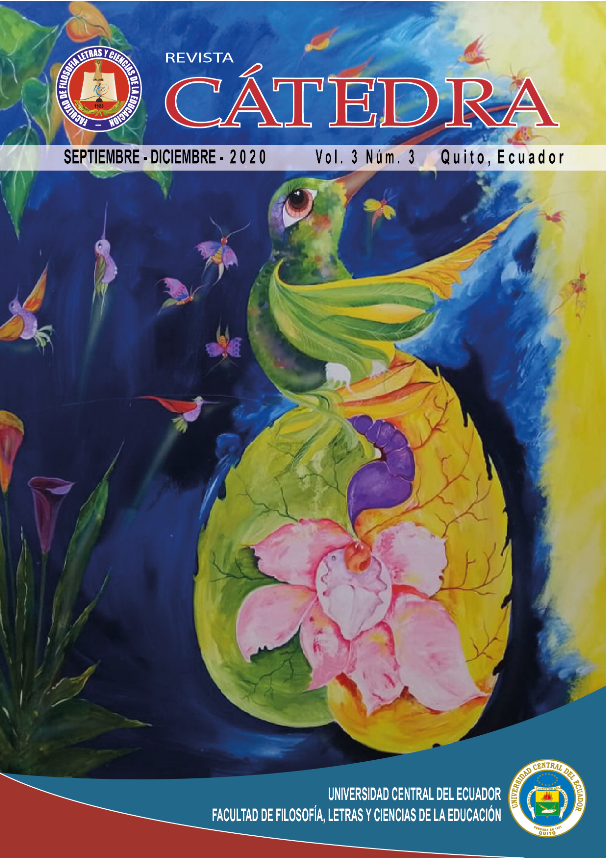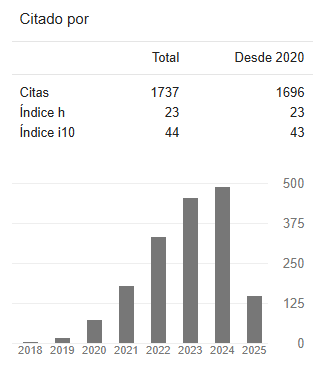Gender stereotypes in the construction of Fang women: a patriarchal education for submission
DOI:
https://doi.org/10.29166/catedra.v3i3.2465Keywords:
Education, stereotype, gender, patriarchy, submissionAbstract
The main objective of this research is to show that gender stereotypes are part of the patriarchal education that Fang women receive. This sociocultural education model is based on submission and dependence, with behavioral guidelines to subject women to the service of men. In such a context, it is not possible to speak of equality because the aptitudes of the woman are undervalued, considering her socioculturally inferior to the man and that, therefore, should remain only in the private sphere. This model of education promoted by the existence of gender stereotypes is a way of socially building the type of woman that society needs. For this reason, the proposed solution is to dismantle the gender stereotypes that constitute the social obstacles created by patriarchy, in order to exclusively favor men to the detriment of women. The method used in this research is explanatory-descriptive, based on the qualitative methodology, based on the bibliographic review and direct observation on the situation of women in the Fang culture, in terms of gender stereotypes. The results achieved with this study show that the empowerment of women is necessary to get out of the everlasting status quo in which she finds herself due to the sociocultural education that has been instilled in her. For this reason, the very voices of the Fang women, demand from the feminist groups, a total dismantling of this patriarchal educational model
Downloads
References
Fundéu. (2015). los nombres propios extranjeros no necesitan cursiva. Recuperado el 25 de junio de 2018, de https://www.fundeu.es/recomendacion/nombres-propios-extranjeros-cursiva/
Real Academia Española y Asociación de Academias de la Lengua Española. (2014). Diccionario de la lengua española. Madrid: Espasa Libros.
Real Academia Española y Asociación de Academias de la Lengua Española. (2010). Ortografía de la lengua española. Madrid: Espasa Libros.
American Psychological Association. (2010). Publication manual of the American Psychological Association (6 ed.). Washington, DC: American Psychological Association.
Fundéu. (2011a). prefijos: cuatro claves para una buena redacción. Recuperado el 25 de junio de 2018, de https://www.fundeu.es/recomendacion/prefijos-cuatro-claves-para-una-buena-redaccion-817/
Fundéu. (2011b). títulos, escritura correcta. Recuperado el 25 de junio de 2018, de https://www.fundeu.es/recomendacion/titulos-escritura-correcta/
Fundéu. (2011c). y/o, fórmula innecesaria. Recuperado el 25 de junio de 2018, de https://www.fundeu.es/recomendacion/yo-formula-innecesaria-1021/
Fundéu. (2012a). el % se escribe separado de la cifra a la que acompaña. Recuperado el 25 de junio de 2018, de https://www.fundeu.es/recomendacion/el-se-escribe-separado-de-la-cifra-a-la-que-acompana-802/
Fundéu. (2012b). mayúsculas (normas). Recuperado el 25 de junio de 2018, de https://www.fundeu.es/consulta/normas-sobre-uso-de-mayusculas-27610/
Schimel, J. (2012). Writing science : how to write papers that get cited and proposals that get funded. New York: Oxford University Press.
Negrín Fajardo, O. (2011). ¿Qué queda en guinea ecuatorial de la educación española? De la Educación colonial a la realidad actual. Revista Historia de la Educación. Vol 30, pp. 111-126.
Pérez Armiño, L. (2018). "Y el sujeto se hizo verbo (aunque siempre fue objeto). La mujer fang en Guinea Ecuatorial y el impacto colonial". Anales del Museo Nacional de Antropología, XX. Madrid: Ministerio de Educación, Cultura y Deporte, 30-59.
Varela, N. (2019). Feminismo para principiantes. Barcelona: Debolsillo.
Puleo, A. (1995). “Patriarcado”, en Celia Amorós (dir). Diez palabras claves sobre la mujer. Madrid: Verbo Divino.
Elósegui, M. (2011). Diez temas de género. Hombre y Mujeres ante los derechos productivos y reproductivos. Madrid: Ediciones Internacionales Universitarias.
Baron, R., & Byrne, D. (1998). Psicología Social. Madrid: Prentice Hall.
Barberá Heredia, E. (2004). Perspectiva socio-cognitiva: estereotipos y esquemas de género. Psicología y Género. Barcelona, pp. 56-80.
Colás Bravo, P., & Villaciervos Moreno, P. (2007). La interiorización de los estereotipos de género en jóvenes y adolescentes. Vol. 25, núm 1. Revista de Investigación Educativa, 25(1), pp. 35-38.
Bosch Fiol, E., & Ferrer Pérez, V. (2003). Fragilidad y debilidad como elementos fundamentales del estereotipo tradicional femenino. Feminismos, núm 2. ISSN 1696-8166, pp. 139-151, pp. 139-151.
Millet, K. (1995). Política Sexual. Madrid: Cátedra.
De Beauvoir, S. (1949). El segundo sexo. Buenos Aires: Siglo Veinte.
López López, M., & Recio González, C. (2008). Masculinidad y feminidad: división errónea de la persona: aportaciones desde la Didáctica de la Lengua. Didáctica. Lengua y Literatura, 20, pp. 247 - 290.
Melibea Obono, T. (15 de Diciembre de 2016). "En España me llaman "la negra", en Guinea Ecuatorial "la españolita". Obtenido de Recuperado el 10 de julio de 2020, de https://www.abc.es/cultura/cultural/abci-trifonia-melibea-obono-espana-llaman-negra-guinea-ecuatorial-espanolita-201612121313_noticia.html
Navarrete, J. M. (2002). Problemas Metodológicos de las Ciencias Sociales en el Perú. Lima: Fondo Editorial de la Facultad de Ciencias Sociales. Universidad Mayor de San Marcos.
Castells, M. (1998 ). La era de la información. México: Siglo XXI.
Ondó Ndjeng, F. I. (2013). Crisis matrimonial hoy en África: Síntesis histórico-doctrinal. Madrid,: Imprenta Tomás Hermanos.
Bituga-Nchama, P. (2020 ). La conflictividad de la ideología feminista en la cultura fang: una aproximación al estudio del patriarcado en Guinea Ecuatorial. Revista Cátedra, 3(1), , 15-27.
Mbana Nchama, J. (2011). Las imágenes públicas de la mujer fang en Guinea Ecuatorial. En Juan Ramón Aranzadi (coord.): II Jornadas de Antropología de Guinea Ecuatorial. Madrid Las imágenes públicas de la mujer fang en Guinea Ecuatorial». En Juan: Universidad Nacional de Educación a Distancia, pp. 121-130.
Reverter Bañon, S. (2003). "Perspectiva de género en la filosofía". Feminismo/s, Nº 1. Universidad de Alicante. ISSN 1696-8166, pp. 33-50.
Sau Sánchez, V. (2001). Diccionario ideológico feminista. 3ª ed. vol. II. Barcelona: Icaria.
Downloads
Published
Versions
- 2021-01-07 (3)
- 2020-12-15 (2)
- 2020-09-29 (1)









